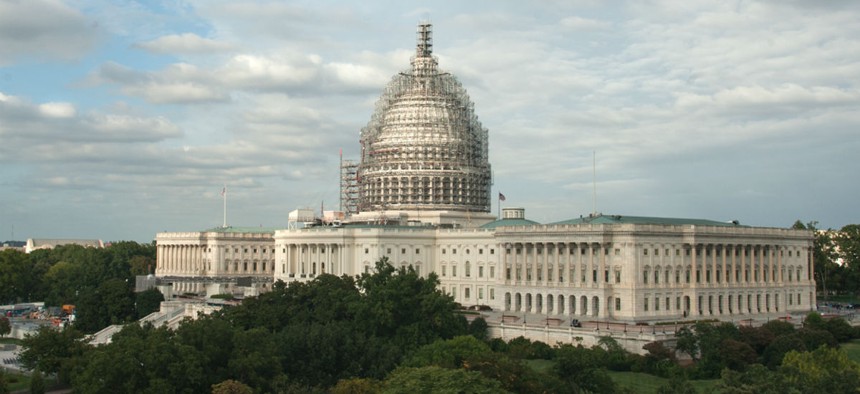
Architect of the Capitol
Senate Approves Budget Deal That Spares Federal Pay and Benefits
The two-year agreement passed early Friday morning despite objections of Cruz, Paul.
The Senate passed a two-year budget deal and raised the debt ceiling in the early hours of Friday morning, sending the combined legislative package to President Obama’s desk just five days before the nation hits its debt limit.
The legislation, which was crafted in a month-long negotiation between Obama and the top four congressional leaders including now-departed Speaker John Boehner, passed on a 64-35 vote over the objections of conservatives and presidential candidate Rand Paul’s shenanigans.
Friday morning’s vote takes some of the pressure off of the Republican-held Congress as members head into an election year. It puts off another debt ceiling crisis until March of 2017 and the two-year $80 billion-plus budget deal will give congressional appropriators some direction as they craft bills to keep the government open and operating through Sept. 2017.
But the latter task is not complete for now. The government’s current funding expires on Dec. 11 of this year, giving Congress just over a month to pass new legislation and avoid a federal shutdown. That effort will be led by Senate Majority Leader Mitch McConnell, who has pushed throughout his tenure as leader for a return to regular order and hopes to avoid passing another slapdash short-term funding bill that would maintain current spending levels; and new House Speaker Paul Ryan, who will hardly have warmed the speaker’s gavel in his hand before having to turn to the often time-consuming process of writing and passing appropriations bills in order to meet that December deadline.
The Senate bill passed only after an awkward back and forth between McConnell and the man he endorsed for president—fellow Kentucky Sen. Paul—subsided.
Paul vowed repeatedly this week—including twice during the course of Wednesday night’s presidential debate—to filibuster the budget deal that McConnell himself help to negotiate.
But he missed his opportunity on Wednesday, as McConnell filed cloture to end debate on the bill. Paul, at the time, was in Colorado for a pre-debate rally. McConnell’s move to file cloture in his absence meant that the bill would come to a vote regardless of what Paul did, his only gambit would be to prevent it from getting 60 votes to move forward—votes that were already there before he returned to Washington from Boulder on Thursday.
Paul did speak on the Senate floor for about 20 minutes on Thursday afternoon to register his opposition to the bill, ending by asking for the unanimous consent of all senators to take up his own balanced budget legislation—a key part of his presidential platform—but that move earned an objection from Democratic Sen. Ron Wyden.
“This is supposed to be the body of deliberation,” Paul said on the Senate floor Thursday. “We’re supposed to be able to deliberate over how we’re going to fix the country. … I will vote no and I will continue this filibuster as long as there are enough votes here to allow it to continue.”
With that, Paul left the floor and took to both television and Twitter where he asked supports to “Stand With Rand” by encouraging their senators to vote against cloture and kill the budget deal.
But by 1 a.m. a cadre of tired senators looking forward to a typical three-day weekend sided with McConnell, voting in support of the budget and debt ceiling deal he’d worked out with Senate Minority Leader Harry Reid, the White House and House leadership.
The House and Senate will return to Washington on Monday.






